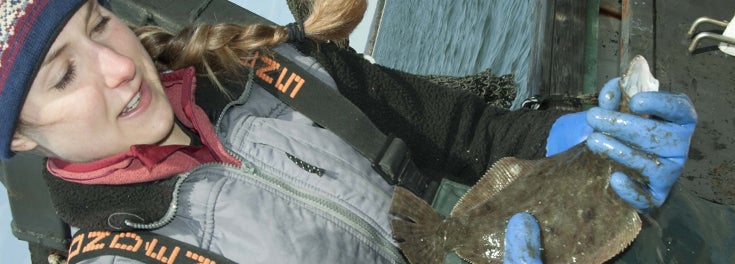
It’s not often that you get to have a hand in breaking a world record, but that’s exactly what URI graduate student Justine Sauvage did in her first voyage on a research ship during her studies at our renowned Graduate School of Oceanography. She was aboard a Japanese vessel when it drilled deeper into the seafloor than any other ship in history. Joshua Kelley ’13 had an equally memorable time on his first shipboard expedition, a trip in the Mediterranean during his very first week as an oceanography student.
I’m particularly proud of the interdisciplinary approach our scientists and students take in their research here, as well as their collaborative nature. That’s how we’re going to solve the problems facing the oceans today. ~Dean Bruce Corliss
“Talk about being thrown into the fire,” he said. “But it was a blast!” He was aboard the E/V Nautilus to study an underwater volcano off the coast of Italy, but during his expedition his fellow researchers also discovered a sunken World War II airplane.
The fact is, Graduate School of Oceanography students get a boatload of opportunities to study biological, physical, chemical, geological and archaeological oceanography in water bodies big and small all around the globe. And they do so with some of the world’s leaders in those disciplines.
The polar regions are a particularly important area of oceanographic research interest, and our oceanography students and faculty are conducting a wide variety of studies there, including research on ocean circulation around Antarctica, population genetics of plankton in the Arctic, the transfer of gases through polar sea ice, and the effect of climate change on Bering Sea fisheries. Other research takes place in Narragansett Bay, the Gulf of Mexico, the South China Sea, the North Atlantic, the South Pacific and numerous other water bodies near and far.
Our scientists also give considerable attention to plankton, which Associate Professor Tatiana Rynearson describes as the fuel of marine ecosystems. “Changes in plankton productivity in response to environmental changes like climate change and coastal development can affect the remainder of the marine food web.”
In the last year alone, our oceanographers and students have studied zooplankton reproduction in the Bering Sea, phytoplankton growth rates in the North Atlantic, the effects of increased carbon dioxide on plankton growth, genetic variation in a large diatom bloom, global dispersal of a marine diatom, and more.
But if plankton aren’t your thing, maybe you’d be more interested in studying ocean acidification, the effect of ocean waves on hurricane intensity, the dynamics of ocean eddies in the North Atlantic, the eruption of lavas on the seafloor, the effect of climate change on fish species in Narragansett Bay, underwater waves in the South China Sea, microbial life deep in the sediments, or strategies for increasing ocean literacy. We do all that, too.
Graduate School of Oceanography Dean Bruce Corliss said, “I’m particularly proud of the interdisciplinary approach our scientists and students take in their research here, as well as their collaborative nature. That’s how we’re going to solve the problems facing the oceans today.”
Pictured above: Oceanography grad student Anna Malek conducting a fish survey aboard the R/V Cap’n Bert.
